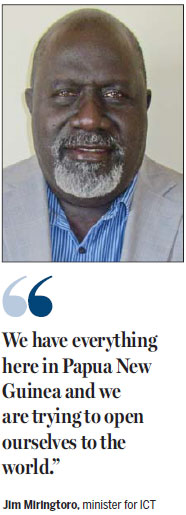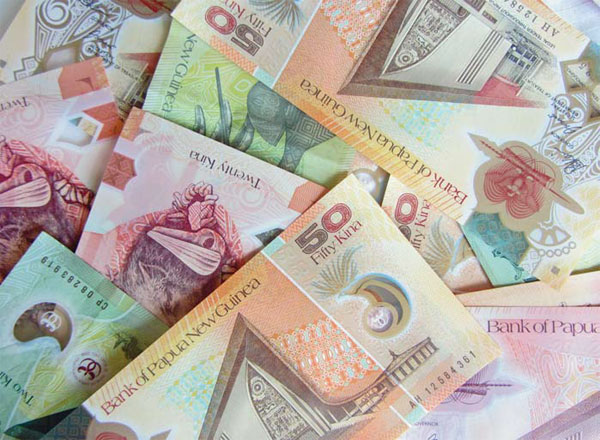Papua New Guinea opens its doors to foreign investors
With the surge of petroleum and mining projects, the Papua New Guinea government has had the foresight to create a sovereign wealth fund to insulate the country's economy from volatility and fluctuations in revenue.
Overseen by the nation's Ministry of the Treasury, headed by Minister Patrick Pruaitch, the fund manages proceeds from mineral and gas exports through the sovereign wealth fund. Offshore proceeds are invested, while onshore revenues are used for infrastructure development.
A spokesman from the Department of Treasure explained: "The fund will also have a buffer so that it does not deplete. Any extra money made, together with any proceeds that come into the country because of price increases in sales or commodities, could possibly be pumped into the economy through the budgetary process to develop infrastructure and provide services in other sectors. Or we can invest through businesses in various investment portfolios."
|
To insulate Papua New Guinea' economy from volatility, the nation has devised a sovereign wealth fund that manages proceeds from mineral and gas exports. Provided to China Daily |
The priority areas of expenditure are threefold: major infrastructure projects will be renewed; there will be money set aside for the future; and the economy will be stabilized.
Development project funds will be targeted at projects discussed in the nation's Vision 2050, a medium-term development strategy, and other government programs.
To be among the top 50 countries in the United Nations Human Development Index, there are several pathways that Papua New Guinea's economy can take. Vision 2050 will pursue four development routes for the first 10 years.
From 2020 to 2050, it will aspire for economic growth at a desirable rate, underpinned by key development projects. These include better service delivery, improved education, improved health services and sound political leadership and structures.
"What this means for investors is a conducive environment in agriculture, tourism, the manufacturing of raw materials, processing of finished products, and a diversified field of business investments will take place out of those many areas when you've got a stable environment," the spokesman said.
"The new plan has gone a long way to create a stable macroeconomic environment for the first time in 30 years.
"Chinese mining companies investing in Papua New Guinea, for example, can rest assured that any proceeds that come out of that activity or business with the Papua New Guinea government are managed through the sovereign wealth fund mechanism.
"The people of the country can disagree if the government is not managing it properly or is not transparent enough. And then it affects not only the government or its leaders, but also business. So this setup also gives confidence to investors.
"The Chinese investor that comes into Papua New Guinea will be assured that landowner issues and any other socioeconomic issues will be properly and prudently addressed through the sovereign wealth fund system, so that a company working in the sector is not disturbed.

"We cannot further develop this country without foreign investment. So we invite it to let it help us.
"This country is so vast, with so many resources. But we don't have the technology. So we want people with technology to come because we can use these resources," the ministry spokesman said.
"Once here, private companies will find a stable place for foreign investment. We have everything here, and we are trying to open ourselves to the world. The Chinese investor who comes to Papua New Guinea will see that it is a long-term investment. He or she will become a corporate citizen of this country because of the conditions that we are creating. There will be competition and there will be stability.
"The people of Papua New Guinea will also be happy because the government is putting the money that comes out of the proceeds of our energy resources into social development, so there will be plenty getting benefits. That will encourage the Chinese investor to invest."
"We will go out to the international market - to the United States, the United Kingdom, Europe, and of course, China, to issue the sovereign bond and raise capital, the balance of which is currently at about 6 billion kina ($2.2 billion)."
Building a country
Infrastructure development is challenging around the world, but in Papua New Guinea, it is more difficult because its tough terrain and geographical features and the high cost of construction and installations.
Traveling by air is the quickest way to get to the 462,840-square-kilometer nation, which has more than 560 airports, 21 of which have paved runways, and two heliports. It also has five major seaports in Kimbe, Lae, Madang, Rabaul and Wewak.
Lae, the capital of Morobe province and the second-largest city in Papua New Guinea, is accessible by the Highlands Highway, the main land transport corridor from the Highlands region to the coast and which is situated near the delta of the Markham River.
It has the largest cargo port in the country and is Papua New Guinea's most industrial city.
Plans are now afoot to open a four-lane freeway and bring Nadzab Airport up to international standards.
Huge changes are also coming for the nation's information and communications technology infrastructures.
Information and Communications Technology Minister Jimmy Miringtoro said: "The sector is creating a lot of opportunities, especially in the banking industry, business sector, housing and retail and education. The latter is becoming more successful as a result.
"Now we have liberalized ICT, we can see big players coming in, like Digicel (a mobile phone network provider). They have the technology, the money, the technical expertise and they are doing very well. This competitive regime has allowed people to have access to the ICT industry."
One of the challenges that must be faced is the high cost of the Internet.
"It is not because we don't have the infrastructure," Miringtoro said. "It is because the fiber-optic network we have is underused.
"It runs through the main centers of the country, from Port Moresby to Australia. And because Telikon - the state operator - uses only 10MB (of bandwidth), traffic was very high and the Internet became very slow. The cost was therefore passed onto the consumer. We are obviously looking at how to solve this.
"Large investments are currently being poured into Papua New Guinea to upgrade its telecom infrastructure. This government has an open door policy to foreign investors."
"This country is so vast, with many resources, but we don't have the technology. If people with technology come, then we can use our resources to their full potential."
InFocus provided this story.
(China Daily 06/29/2015 page15)















